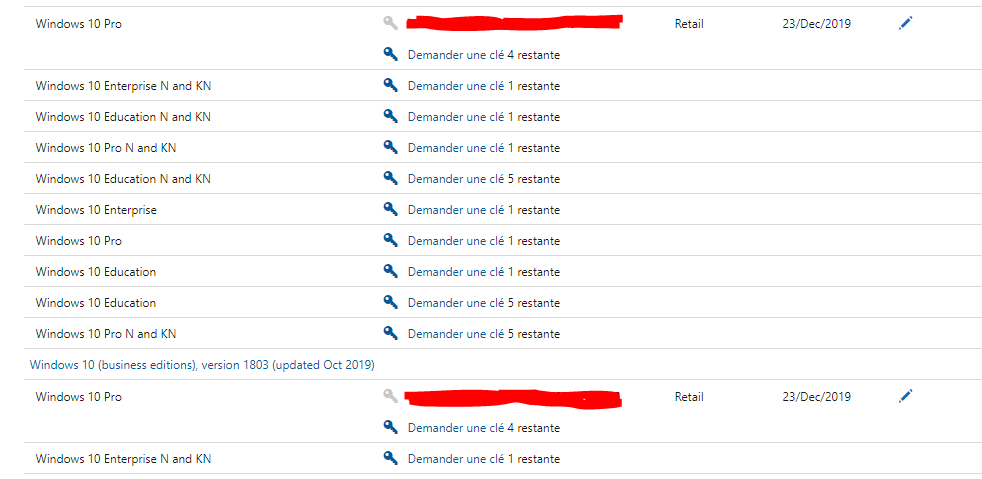The company I work for provides all developers with a Visual Studio Professional subscription as a benefit of their employment. This subscription includes access to various tools such as DevOps, Azure, Visio, and SQL servers, as well as retail Windows 10 product keys.

If I were to use one of these keys to install Windows 10 on my personal computer at home, and then my contract with the company were to end, would my company have the ability to revoke the Windows 10 license?
In other words, Are Windows 10 retail keys provided through a Visual Studio Professional subscription revocable by the company if the employee’s contract is terminated?
3 Answers
The Short Answer
Yes, it is possible for a company to revoke a Windows 10 retail key that was provided through a Visual Studio Professional subscription if the employee’s contract is terminated. However, whether or not the company chooses to do so is ultimately up to them.
Understanding Windows 10 Retail Keys
Before diving into the specifics of revoking Windows 10 retail keys, it’s important to understand what exactly a retail key is. A retail key is a unique code that is used to activate a copy of Windows 10 on a single device. Retail keys are typically sold to consumers who purchase a new computer or upgrade their operating system.
In the case of Visual Studio Professional subscriptions, companies are provided with a certain number of retail keys as part of their subscription benefits. These keys can be used to activate Windows 10 on the devices of employees who have access to the subscription.
The Revocation Process
If an employee’s contract with a company is terminated and they have used a retail key provided through the company’s Visual Studio Professional subscription to activate Windows 10 on their personal device, the company does have the ability to revoke that key. This means that the copy of Windows 10 on the employee’s device will no longer be activated and they will need to obtain a new product key in order to continue using the operating system.
The process for revoking a Windows 10 retail key varies depending on the specific circumstances. In some cases, the company may choose to simply deactivate the key from their account, which would prevent anyone from using it to activate Windows 10 in the future. In other cases, the company may need to contact Microsoft directly in order to have the key revoked.
Considerations for Companies
While companies do have the ability to revoke Windows 10 retail keys provided through a Visual Studio Professional subscription, it’s important to consider the potential implications of doing so. Revoking a key from an employee’s personal device may be seen as a punitive measure and could damage the relationship between the company and the employee.
Additionally, revoking a key may not be necessary in all cases. If the employee in question is leaving the company on good terms and has no intention of using the Windows 10 license for commercial purposes, the company may choose to simply let the license expire naturally.
Alternatives to Revocation
If a company does not want to revoke a Windows 10 retail key provided through a Visual Studio Professional subscription, there are alternative options to consider. One option is to transfer the license to another employee who has a need for it. This can be done through the Visual Studio portal and allows the company to maintain control over the license while still providing value to their employees.
Another option is to simply allow the employee to keep the license. While this may not be the most secure option from a licensing perspective, it can be a way to maintain positive relationships with departing employees and avoid potential conflicts.
Conclusion
In summary, companies do have the ability to revoke Windows 10 retail keys provided through a Visual Studio Professional subscription if an employee’s contract is terminated. However, whether or not they choose to do so is ultimately up to them and should be carefully considered based on the specific circumstances. Alternatives to revocation, such as license transfer or allowing the employee to keep the license, should also be considered in order to maintain positive relationships with employees and avoid potential conflicts.
When a Windows 10 license key is provided as part of a Visual Studio Professional subscription, it is typically intended for use within the company. The key may be tied to the company’s license agreement with Microsoft, and the company may have the ability to manage and revoke the key if necessary.
For example, if an employee leaves the company, the company may revoke the key to ensure compliance with the license agreement. If the employee continues to use the key after leaving the company, it would be considered a violation of the license agreement and may result in legal action by Microsoft.
It’s important to check with your company’s IT department or HR to understand their specific policies and guidelines regarding the use of software licenses for personal computers. They may have additional terms and conditions that apply to the use of the licenses outside of the company.
Can my company revoke my Windows 10 license if I use one of the retail keys provided by my Visual Studio Professional subscription, and I end my contract with the company?
Windows 10 keys can only be revoked by Microsoft, and they will not do so just because an employee used the key outside the terms of the agreement. However, if you end your contract with the company, they can revoke your access to the Visual Studio subscription by disassociating your account from the subscription.